|
Music Is The Healing Force Of The Universe The Inconsistency of |
|
|
||||||||||||||||
|
September 1 2022
Don Ayler in Florence 1981 I know I’ve had this on this site for quite a while now, but my version of the 3 LP set (never available on CD, and still not) was taken from a cassette recording of the LPs transferred to minidisc thence to the mp3s you’ll find here. Now, however you can find a better copy of the iconic set to download at qobuz released by Railroad Town Music. The sleevenotes and the background to Donald Ayler’s Florence concerts are available on the Donald Ayler Discography page. And there’s a piece about the new version by Tim Niland at Music and More. Coincidentally, Dirk Goedeking sent me a link to ‘Suite Requiem for Ukraine’, by drummer Phil Raskin, with Ratzo Harris (bass) and Frank Doblekar on saxophone - perhaps the same one which he played with the Don Ayler Septet in Florence in 1981. As Phil Raskin writes: ‘This suite which consists of two compositions, "Sadness" by Ornette Coleman and "Angels" by Albert Ayler serves as our tribute to all of those who have loved and lost in the horrible war in Ukraine.’ The suite is included on the album Satya, available on bandcamp, or can be purchased separately with the proceeds going to the World Central Kitchen which is helping the victims of the war. * Albert Ayler International Dirk sent a variety of items this month from around the world - some of which I already had, some have flown to their relevant resting place, and this is the remainder: An Hungarian article about Albert Ayler. A Japanese article about Albert Ayler. To which I add a Japanese piece about Spiritual Unity. Scottish tour dates for ‘Where Rivers Meet’. |
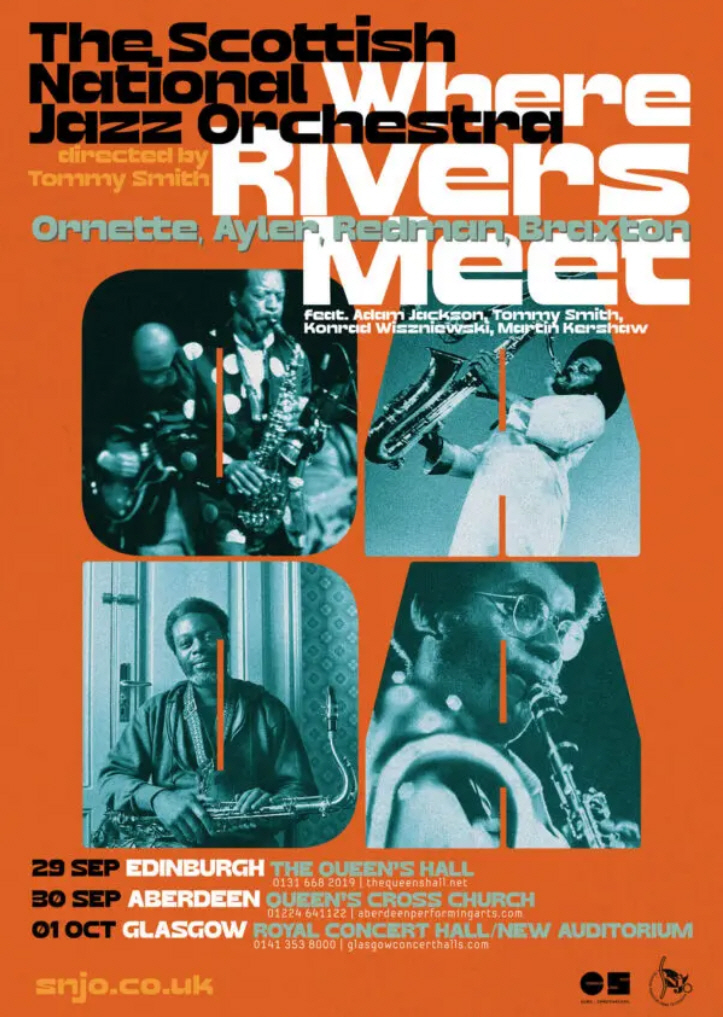 |
||||||
|
There was also a link to an Austrian concert by the confusingly named The Way Ahead, the Scandinavian Ayler-influenced band, on youtube from last year. This rang a bell and I had mentioned it before, but the link had disappeared, so here it is again. I can also add to the list: The first Spanish translation of Ekkehard Jost’s seminal work Free Jazz, published in Argentina. From Sweden, via Estonia, the Rickard Malmsten Quartet playing “His Name Was Albert Ayler”. And two tributes to Albert, one on violin, from Germany, and the other, on cor anglais, from France. * Abdul Wadud ((30/4/1947 - 10/8/2022) Sad to report the death of Abdul Wadud, at the age of 75. The cellist was a member of the Black Unity Trio, and there are obituaries at The Guardian, NPR and this piece by Pierre Crépon in The Wire which gathers some memories of Abdul Wadud from fellow Cleveland musicians. * New Ghosts in Cleveland The trio of Nate Wooley, Ken Vandermark and Paul Lytton are celebrated in an article in Jazz Times, which begins: “We like to bring music to Cleveland in the spirit of the great and incredible and wonderful Albert Ayler. Let’s get a round of applause for all he stands for!” As those words rang from the stage of the Bop Stop, a jazz club on the near-West Side of Cleveland, Ohio, the audience packing the house let out cheers.” * Some Musicians Talking About Albert Ayler Catchy... First off there’s this quote from an article about the FMP label in Jazz Journal: ‘Probably the most significant figure in that European movement is Peter Brötzmann, who has been associated with the FMP label since its inception. He has said: “All we talked about was how to get rid of the old structures,” paralleling the aims of the Darmstadt school. “I never thought music was a healing force of the universe. I didn’t agree with Mr. Ayler. But we wanted to change things, we needed a new start. In Germany, we all grew up with the same thing: ‘Never again.’ But in the government, all the same old Nazis were still there. We were angry. We wanted to do something.”’ And then there are these bits from interviews in Coda, collected in Jazz Greats Speak: Interviews with Master Musicians by Roland Baggenćs (Scarecrow Press, 2008), which I’ve only just come across (only 14 years later) in a preview on google books. Dexter Gordon: |
||||||
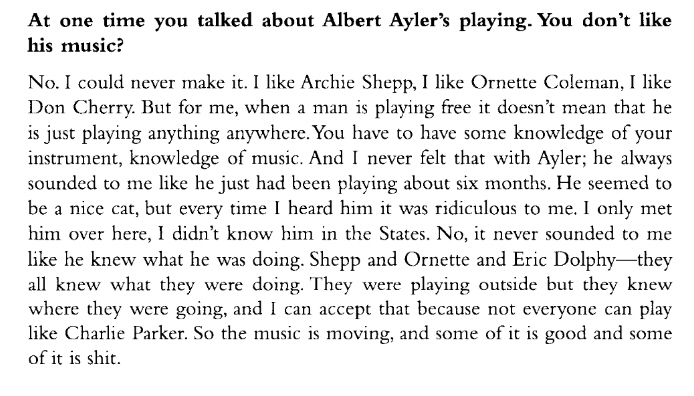 |
||||||
|
Marc Levin: |
||||||
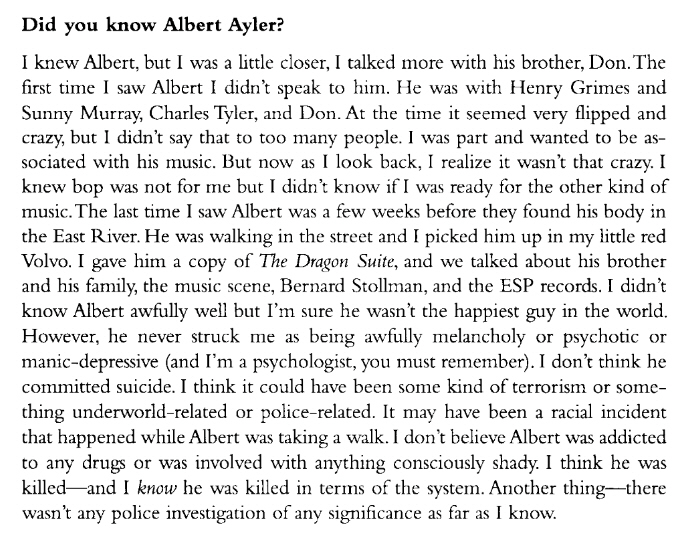 |
||||||
|
John Tchicai: |
||||||
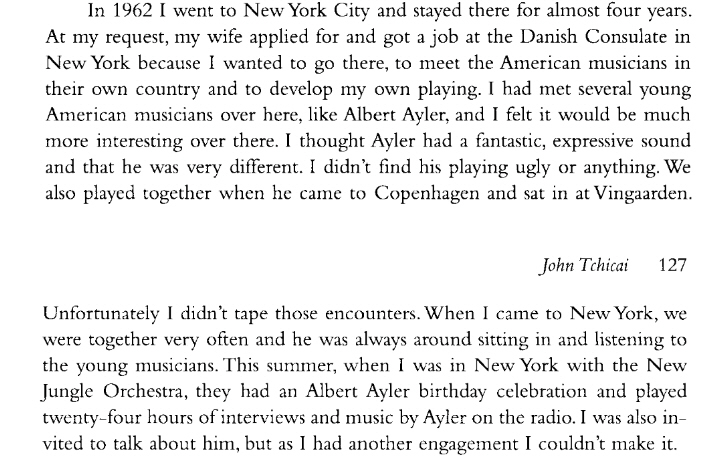 |
||||||
|
More from youtube How does he come up with them ... There’s another talk about Spiritual Unity, this time in English - it’s Episode 308 in the series of Ten-Minute Record Reviews. A version of ‘Music Is The Healing Force Of The Universe’ from Sunshine the Afrooist. And, finally, there’s a review of Ornettiquette at a Jazz on Jay concert last month in Schenectady, NY, on the Nippertown site. No video, but here’s an old one from January, 2019 where the band is joined by Karl Berger and vocalist Ingrid Sertso.
|
|
What’s New May to August 2022 is now in the Archives. ***
October 1 2022
“Trane was the Father, Pharoah was the Son, I was the Holy Ghost” Albert Ayler’s famous description of the relationship between John Coltrane, Pharoah Sanders and himself, is a fitting way to start this month, for the Son is dead and the Holy Trinity is no more. Pharoah Sanders (13/10/1940 - 24/9/2022) |
|||||||||||||||||||||||||||||||||||||||
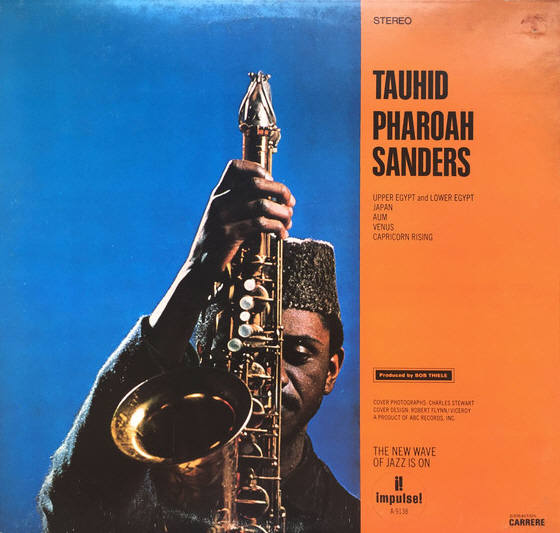 |
|||||||||||||||||||||||||||||||||||||||
|
There are obituaries in The Guardian (Richard Williams), The Washington Post and on the Pitchfork, Vulture, Jazz Times sites. Pierre Crépon has a piece at the Wire concerning Pharoah Sanders’ Impulse recordings (part of a longer work in progress) and there’s a tribute by Oli Hayhurst at London Jazz News. Pharoah Sanders did not record officially with Albert Ayler, but their paths did cross on at least two occasions when a tape machine was present. The first, at the ‘Titans of the Tenor’ concert on 19th February, 1966 at the Lincoln Center - a tape of which is believed to exist in the Coltrane archives. And the second, at the Renaissance Ballroom, New York on 21st January, 1968. A 23 minute section from the latter was included in the Holy Ghost box set and is available below: [Personnel: Chris Capers (t), unknown (poss. Noah Howard) (as), Pharoah Sanders, Albert Ayler, unknown (ts), Dave Burrell (p), Sirone (b), Roger Blank (d).] As for the picture I've used above. There are plenty of photos of Pharoah Sanders out there, captured in full throttle or quiet repose. So I thought I'd go with the back cover of Sanders' first LP for Impulse, Tauhid. This was the first proper Impulse import I bought, probably from Dobell's in Charing Cross Road. You couldn't get imports in Stoke, and you were happy with the (British) EMI versions of Coltrane Impulse LPs, likewise the Fontana versions of the ESP catalog, with covers of the thinnest cardboard imaginable. So, Tauhid with its gatefold sleeve was a thing of beauty (and a joy forever). It was also the first time I'd heard the mighty Sonny Sharrock. Bliss was it in that dawn to be alive ... * Munich again I don’t know how many times over the years I’ve mentioned the legendary TV studio recording in Munich by the Albert Ayler Quintet during the 1966 European tour. Bill Folwell and Michel Samson both remembered it quite well but there was no trace of it anywhere - no bootleg tapes from the time-honoured practice of holding a microphone up to the TV’s speaker, no review or advert from a contemporary German newspaper. Considering the amount of material which the London School of Economics gig has generated over the years, and that was definitely never shown (maybe even never shot), then how come the Munich programme has managed to leave no trace? It turns out it was just hiding - in plain sight. A couple of weeks ago I got an email from Fabian Manco. He’d just watched the Tom Surgal documentary Fire Music (currently streaming on the Criterion Channel) and sent me the Ayler section which included a short clip of the Ayler group performing ‘Infinite Spirit’. Fabian realised it wasn’t from the Berlin concert, but wanted to know if I recognised it. I thought it must be from the Bordeaux TV programme since I remembered emailing Tom Surgal around the time he was crowdfunding to finish the film and I suggested he might want to use the (then recently discovered) Bordeaux footage if he wanted a clip of Ayler. But it isn’t Bordeaux. Same tune, but the visuals don’t match. At first I thought maybe they’d messed around a bit with the footage (as Kasper Collin did in My Name Is Albert Ayler) but that didn’t make sense. And then there was the credit for the clip: ‘Zur Nacht€ť Albert Ayler: Our Prayer (1967) Courtesy of WDR mediagroup GmBH.’ So I consulted with experts and the answer comes back - it must be Munich. Which is great that it’s finally found, but annoying, because I’ve had the following on the Bibliography page for years now in the TV appearances section: “Musik ‘Zur Nacht’ - Das Albert Ayler Quintett”. Date of transmission: ?/11/66. WDR. I always assumed this was just repeats of the Berlin footage. Wrong again. Actually I may have spotted the mistake earlier - back in October 2018 when Fire Music was premiered. I did a piece about it but never checked the trailer, which I assumed was the old one, not so, it was this one:
|
|||||||||||||||||||||||||||||||||||||||
|
Around the 32 second mark Albert appears for a second - that’s from the Munich TV studio session. What happens now of course, is we have to find out how much of the session has survived. And maybe we can finally put to rest the matter of the ‘Rotterdam Tape’. * It’s arrived!!! |
|||||||||||||||||||||||||||||||||||||||
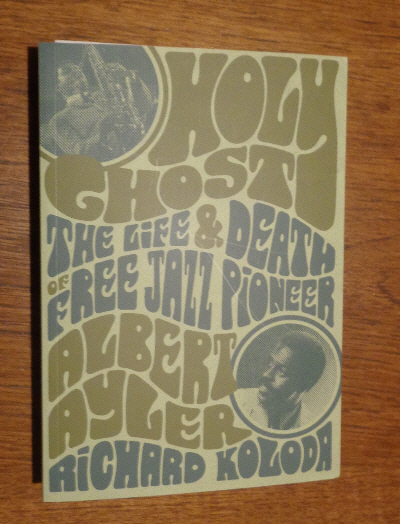 |
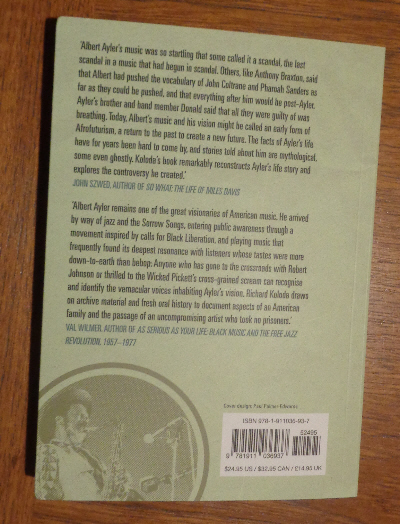 |
||||||||||||||||||||||||||||||||||||||
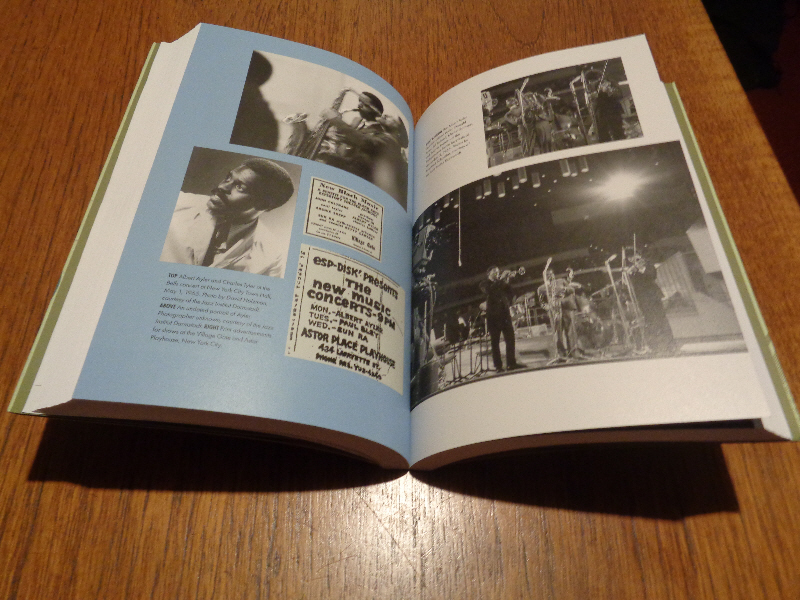 |
|||||||||||||||||||||||||||||||||||||||
|
Last week the postman dropped this through my letterbox - a complimentary copy of Richard Koloda’s book, Holy Ghost: The Life & Death of Free Jazz Pioneer, Albert Ayler. It’s due out on 8th November, so I’ll give it a read and let you know my verdict next month. Actually I could do it now, I seem to have been reading it for the past 20 years in one form or another. But it will be nice to sit in a comfy chair with a cup of tea and read it like a proper book, not on a screen, and not constantly checking facts and hunting down typos. The book has already garnered praise from the likes of Val Wilmer, John Szwed and Scott Yanow, and Booklist (the American magazine for the publishing trade) described it thus: “Koloda’s deeply perceptive, revelatory, and vibrant biography confirms beyond a doubt Albert Ayler’s standing as a visionary in the jazz pantheon.” Next month you will find out whether I concur. * Talking of books Dirk Goedeking spotted this: The Cricket: Black Music In Evolution, 1968-69 published by Blank Forms. All four issues of The Cricket, the magazine produced by Amiri Baraka, A. B. Spellman and Larry Neal. The final issue is on this site, since it contains Albert Ayler’s ‘To Mr. Jones - I Had A Vision’, as well as a coruscating review of New Grass. I’ve not seen the other issues of the magazine so I don’t know whether there is anything else directly related to Ayler, but they will definitely be worth reading. |
|||||||||||||||||||||||||||||||||||||||
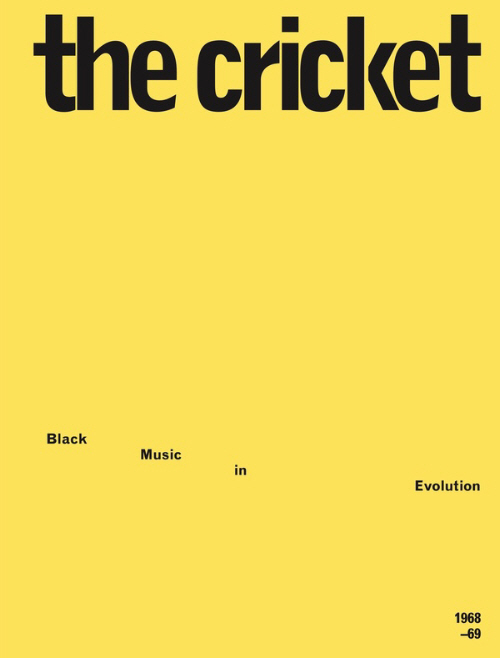 |
|||||||||||||||||||||||||||||||||||||||
|
And Pierre Crépon let me know about a review he’d written for the Wire of a book by Ubadah McConner, entitled The African OmniDevelopment Space Complex We/New, published by Arteidolia Press. I found this quote from Pierre’s review particularly intriguing: ‘The African Omnidevelopment Space Complex/We New. McConner ran sessions under that name at his home from 1972-2002, with doors open to anyone willing to join, prior experience or not. McConner doesn’t describe the music played in detail but the terms he uses are clear enough: “fire music” and “OUT”. “We never attempted to play any song,” he writes. “We just played as hard as we could, as long and as loud as we could and let the spirit take over.” The complete discarding of composed material in favour of total improvisation remained a radical stance within avant garde jazz - to the point that it’s commonly thought of as a European development.’ |
|||||||||||||||||||||||||||||||||||||||
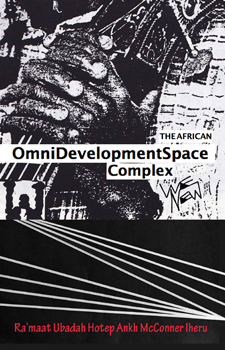 |
|||||||||||||||||||||||||||||||||||||||
|
Some other stuff Youtube’s got ‘Ghosts’ on double bass and electric guitar, as well as a trio version of ‘Change Has Come’:
|
|||||||||||||||||||||||||||||||||||||||
|
The rest is from Dirk Goedeking: A new vinyl edition of The Hilversum Session, nothing fancy, original Osmosis artwork, so I would normally just list it in the discography and let it go, but I liked the little turntable on the deejay.de site which spins as the samples play. Simple things ... A flyer from the Astor Place Playhouse show in February 1966 - back and front. |
|||||||||||||||||||||||||||||||||||||||
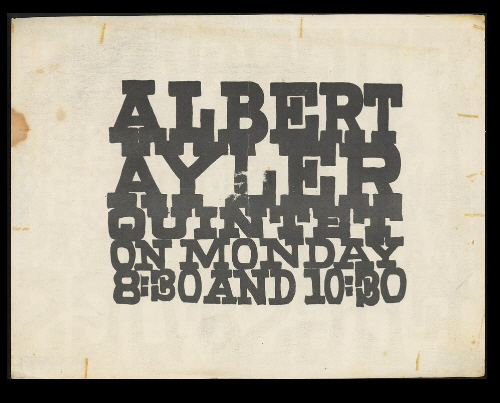 |
|||||||||||||||||||||||||||||||||||||||
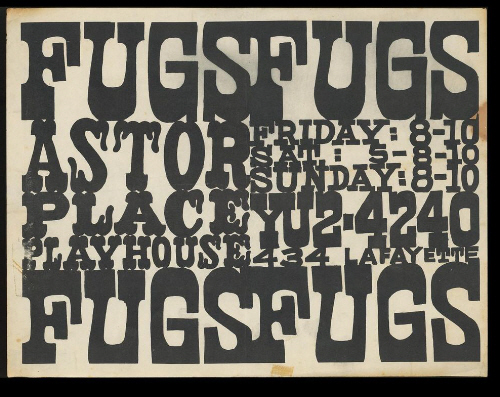 |
|||||||||||||||||||||||||||||||||||||||
|
and finally ... "... was very happy to find Albert Ayler’s Love Cry in a pristine condition. Had to take him up in the sky…". |
|||||||||||||||||||||||||||||||||||||||
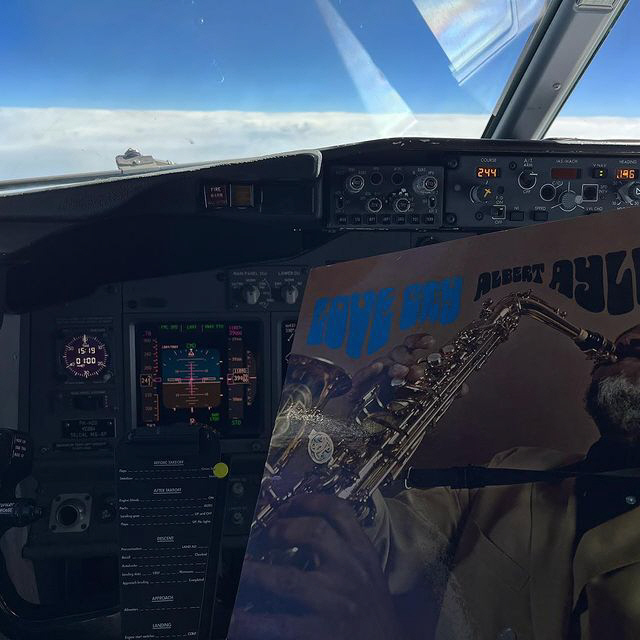 |
|||||||||||||||||||||||||||||||||||||||
|
To which I feel a need to invoke the spirit of Kevin Bacon in Diner and repeat the immortal line: “Do you ever get the feeling that there's something going on that we don't know about?” ***
November 1 2022
Holy Ghost: The Life & Death of Free Jazz Pioneer, Albert Ayler by Richard Koloda |
|||||||||||||||||||||||||||||||||||||||
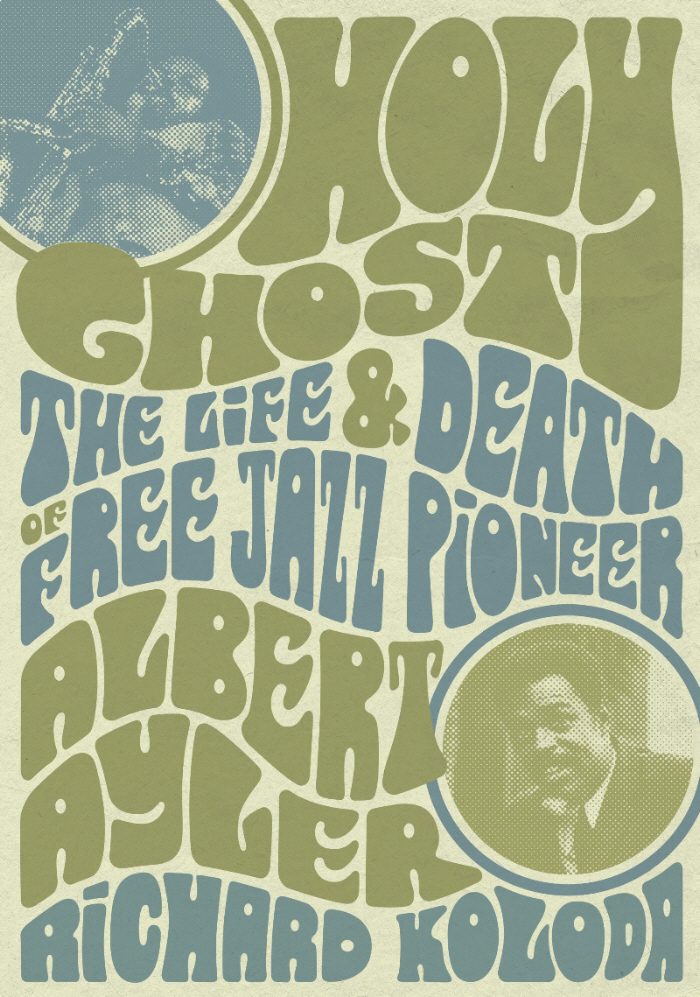 |
|||||||||||||||||||||||||||||||||||||||
|
Fifty-two years after the death of Albert Ayler the first book-length biography written in English has finally been published. I know the English translation of Peter Niklas Wilson’s Spirits Rejoice came out earlier this year, but I think you’ll forgive me that opening sentence since I’ve been waiting a long time to write it. Richard Koloda’s Holy Ghost has been over twenty years in the writing and researching, not to mention the time it took him to convince a publisher to recognise the merit in his work. Jawbone Press (based in the U.K. - wave flag here) stepped up to the mark and have done a wonderful job. I’m sure that this book will become the definitive work on the Ayler brothers and their music. And let it be said here (and repeated later) that Mr. Koloda began this book as a kind of loose collaboration with Donald Ayler and it is as much his story as it is Albert’s. As time passes and memories fade and the remaining actors who knew and possibly played with or maybe just witnessed a performance by Albert Ayler, leave the stage, then we will maybe get the odd academic tome deconstructing the music, dotting the quavers here and there, but there surely won’t be another biography which unearths so many new details, and puts so much more flesh on the bones of the story. Mr. Koloda does acknowledge his debt to those who have tried to deliver the story of the Ayler brothers before, notably Val Wilmer, Peter Niklas Wilson, Jeff Schwartz and Marc Chaloin, and he also quotes from many other sources, interviews and articles and reviews, but the real beauty of Holy Ghost is the result of Mr. Koloda’s own meticulous research and his own interviews. This is particularly noticeable in the sections dealing with the Aylers’ (and Mr. Koloda’s) home town of Cleveland, Ohio. Much as Marc Chaloin’s article in the book which came with the Holy Ghost box set (I can see confusion ahead) revealed the life of Albert Ayler during his early career in Europe, Mr. Koloda’s Holy Ghost does the same job with the Ayler brothers’ childhood and upbringing in Cleveland and their subsequent ‘adventures’, shall we say, in that city. There are many problems for a biographer of Albert Ayler. There was no chance that all the mysteries of Albert’s life would be revealed. Unless the Mafia man who tied him to the jukebox and threw his lifeless body, riddled with bullets, into the East River, comes forward and confesses, we will never know what happened to Albert during the last few weeks of his life. However, in place of speculation, Mr. Koloda offers us Albert Ayler’s death certificate (no mention of bullet holes, no mention of jukeboxes). More difficult for a biographer is how to deal with the discography. Albert Ayler’s recording career only lasted for eight years, from 1962 to 1970. In that eight years only thirteen LPs were released (and that includes Something Different!!!!!, which had a very limited release and then a better distribution as The First Recordings in 1969, and Sonny’s Time Now, which is technically Sunny Murray’s record and also had a very limited release). The various iconic ensembles, the trio with Peacock and Murray only made one record, the quartet with Don Cherry, one, the band with Charles Tyler, two (strictly one and a half), the Michel Samson band, one, the line up with Alan Silva and Milford Graves, one, and two Mary Maria productions. After Albert’s death another thirteen albums were released as well as the Holy Ghost box set and the complete Fondation Maeght concerts. If one was writing a biography of Albert Ayler in 1971, the year after his death, then it would be quite simple to describe the arc of Albert’s career from its simple, fumbling beginnings in Scandinavia, through the wonders of his middle period to the ignominy of its end. But now, and for as long as Mr. Koloda has been writing his book, one has to decide whether to go with a strict chronology of recording dates, and try to accommodate the shifting critical response to Albert Ayler, or add the posthumous releases as footnotes. The latter would be annoying (all footnotes are annoying) but the former presents a bit of a minefield, which I have to admit Mr. Koloda negotiates with ease. He selects his quotes from both sides of the argument - Ayler the charlatan or Albert the genius (particularly during his lifetime) - and deals with the later albums as they were recorded, not released, which gives a more rounded picture of Ayler’s career, especially when dealing with, what we can call, ‘the Samson band’ which is probably the best represented in the posthumous albums, with the La Cave and Slugs’ sessions and the 1966 European tour. Another thing I like about the book, which demonstrates Mr. Koloda’s skill as a writer, is the way he will undercut the narrative with the odd funny story. If you are going to quote Albert’s interviews then you are going to get a lot of, let’s call it hippy talk, which, admittedly we all bought at the time, but now seems a bit ‘precious’. So Mr. Koloda lightens the burden on our souls by telling the tale of Donald going to Sweden (with Mutawaf Shaheed) to link up with Albert’s Swedish ex-girlfriend, who rebuffs his advances and tells him to go north and get a job as a lumberjack, or the one about his wife giving him $300 to rent an apartment in New York, instead of which he and Don spend it on marijuana. There are a few drug tales in the book but Mr. Koloda is always precise with his facts and maintains the long-held impression that Albert never (knowingly) touched the hard stuff. On the minus side, there’s the odd minor mistake, for example: the fabled’ Rotterdam Tape’ was not in the Holy Ghost box set. But of more concern are a few omissions. The fact that Albert’s gravestone states that he served in Vietnam and implies that he died there, is not mentioned, so no explanation of why the family never had it changed. And then there’s no mention of the legal dispute with Revenant Records and the seizure of the remaining stock of Holy Ghost boxes by ESP-Disk. We know how it came about, but why did Revenant Records feel it necessary to bypass the Ayler Estate in the first place. And, for that matter, what’s really going on about the release of the Fondation Maeght film, or a DVD release for Kasper Collin’s My Name Is Albert Ayler. In Mr. Koloda’s defence it could be said that the book is a biography of the Ayler brothers and need not concern itself with minor matters which just annoy Ayler fans. On the whole Mr. Koloda does treat the usual suspects fairly, Bernard Stollman, Amiri Baraka and even Mary Maria. When it comes to what drove Albert over the edge, I’d lay the blame at the door of Impulse Records for cancelling his contract (and buggering up his music) and the Bible for doing the same to his mind. Mr. Koloda does compare the lives of the Ayler brothers to Greek tragedy, but I think the Bible is a better model. Esau selling his birthright for a mess of pottage, ‘Am I my brother’s keeper’, watch out for evil women with scissors, lots of stuff. I am a great believer in the old Jesuit dictum: ‘Give me a child until he is seven and I will give you the man’. Albert was born into that old time religion and that’s where the music came from, and a lot more besides. In the end I think we all fill in the gaps and make up our own Alberts and Donalds. For example, I never believed Albert had a $250,000 contract for a tour of Japan. I think people lie and embroider and pretend and if Albert had that much money coming he would never have jumped. And, of course, other people think 'A Man Is Like A Tree' is good. I did consider writing two reviews of Mr. Koloda’s book. Not in the Downbeat fashion of one good, one bad, but rather, one reviewing the biography of Albert, the other the biography of Donald. I remember the very first draft of Holy Ghost (no title as yet) which Mr. Koloda sent me. It began like a film noir, detailing his first meeting with Donald. More Chandler than Hammett, with Donald described, if memory serves, as the coolest man he’d ever met. Since then of course, Don has died, and his later life was a downward spiral, involving a cocaine habit, a failed marriage, several stays in mental institutions and a brief spell in jail. All of this is now placed at the end of Holy Ghost in a Postscript. It made me think of that story by Jorge Luis Borges (whose grandmother was born up Hanley): ‘Three Versions of Judas’. Albert Ayler was the Holy Ghost, but Donald Ayler was Borges' Judas Iscariot, the true apotheosis of Free Jazz, unschooled in music, but belting out whatever he could and getting nothing in return except derision and banishment and madness and death. I hope Mr. Koloda's book, as well as cementing the reputation of Albert Ayler, will also mean that Donald Ayler is not forgotten. All in all, this is a great book, buy it! |
|||||||||||||||||||||||||||||||||||||||
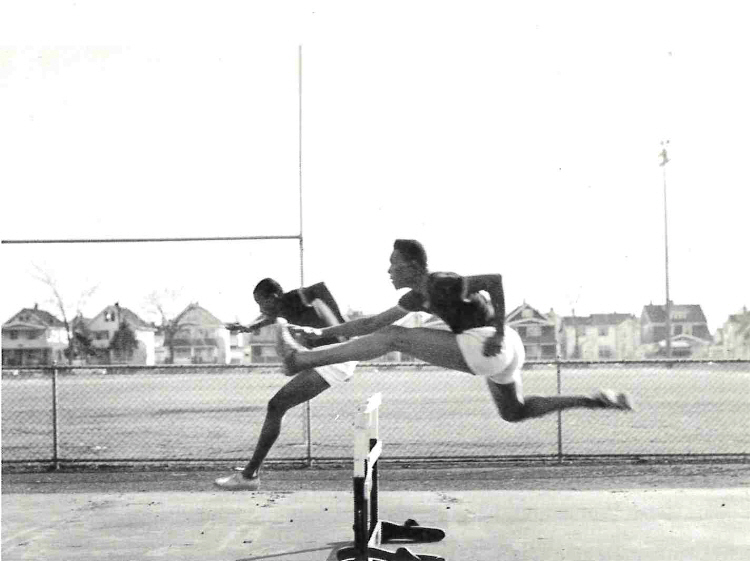 |
|||||||||||||||||||||||||||||||||||||||
|
(Donald Ayler jumping the hurdles during his time at John Adams High School, Cleveland. Thanks to Richard Koloda for the photo.) *
And there’s more! If you want to find out more about the book and the man who wrote it then there’s an interview with Richard Koloda on the Wave Farm site - Richard appears around the 7 minute mark. There’s a teaser trailer for the book on the Jazzwise site which ends with the following: “Watch out for a major Albert Ayler feature in Jazzwise's special Dec/Jan double issue, on sale 17 November.” The London Jazz News site has a review calling it “an important book that comes at a time when many listeners and critics are rediscovering Ayler’s work. It combines analysis of the recordings and description of Ayler’s short life very effectively, and makes one keen to return to listen to his music.” The New York City Jazz Record has this review in its November issue. And Woody Haut’s Blog has a dual review of Richard Koloda’s Holy Ghost and the reissue of The Cricket. I mentioned the latter last month and Werner Uehlinger (of Hat Hut fame) sent me a link to another item on the Blank Forms website which I’d missed. It was for a ‘day-long radio show’ streaming from various sites on October 2nd. Too late to tell you now, of course, but maybe traces of it have survived somewhere - although I’ve tried all the links on the Blank Forms site until I was at the bottom of the bowl and came up empty. Just so you know I’m not always late, Analog Planet has the news that “Verve Records/UMe Partner With Third Man Records to Relaunch Popular Verve By Request Reissue Series, Commencing With Two 180g LP Releases on November 11, Followed by Two More on December 9.” Love Cry is scheduled for release on 30th June, 2023. So there. *
As explained last month, we (I spread the blame) have finally found the Munich video footage. We still don’t know exactly where it was recorded, or when - 4th, 5th or 6th, November 1966 - or whether what has remained is all there ever was, but it is the programme: “Musik ‘Zur Nacht’ - Das Albert Ayler Quintett”. I did nothing except apologise for not realising it had been listed on this site for years and mistaken for an excerpt of the Berlin concert footage, so over to Dirk Goedeking who did all the hard work. “WDR didn't supply further information, but the video is accessible for the public. The archive gives it to editors, schools, museums, ... and ‘Privatpersonen’. It can be ordered with different legal options. I tried to order it, paying 29 € for private use in one private household. Suprisingly it worked. After three weeks I got a huge 969668 KB mp4 video file (VCL) download: ‘109745_Zur_Nacht_vom_09_08_1967_Das_Albert_Ayler_Quintett_Our_Prayer_0160810_F01’. The video (format 4:3, black/white, SD, 60s studio quality, camera mostly close ups, WDR in the top left corner) has the following content: 00:00 "Das Albert Ayler Quintett" The video can be ordered online https://wdr-mediagroup.com/geschaeftsfelder/i-o/mitschnittservice/#anfrageformular , By phone +49-221-2035-1133 (Mo 13-15h, Th 14-16h) , or by mail mitschnitt.fernsehen@wdr.de.” |
|||||||||||||||||||||||||||||||||||||||
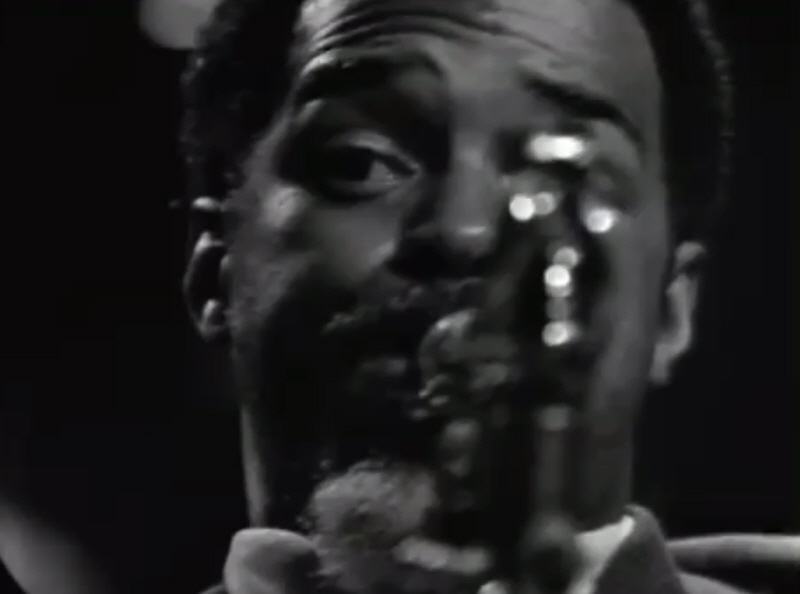 |
|||||||||||||||||||||||||||||||||||||||
|
I should also give a quick shout out to Ernst Nebhuth who also joined in the hunt for the fabled Munich footage. At least now we know it still exists and hopefully at some point somebody will come up with the cash to release it properly on DVD or Blu-ray. In fact that was what I was hoping for when Dirk also found the Berlin concert. At the time, back in March 2016, I was a bit coy about it, since I thought there was a good chance we could interest someone in releasing it, so I just added the information that it existed to the Bibliography, and, if anybody asked, then I’d tell them how to go about acquiring it. There was no great rush so I forgot about it, but now I thought I should add that information to the site as well. You’ll find Dirk’s (ITMA) initial email with all the relevant details in the TV Appearances section of the Bibliography. It’s a similar deal as the Munich programme, but you get a DVD with the other bands on the bill and the complete 30 minute performance by the Ayler group. But the information is now six years old, so the price will have gone up and I don’t even know whether they’re still selling copies for strictly personal use only. * Two from youtube Not a quick roundup this month but two major (i.e. long) pieces. The first from Hungary is a 72 minute documentary, Free the Jazz, directed by Czabán György and featuring contributions from Courtney Pine, Mats Gustaffsson, Matthew Shipp, Peter Brötzmann, Paal Nilssen-Love, Soil & Pimp Sessions, Ken Vandermark, Joe McPhee, Conrad Bauer and Trevor Watts. Here’s the trailer:
|
|||||||||||||||||||||||||||||||||||||||
|
And here’s the full film.
|
|||||||||||||||||||||||||||||||||||||||
|
The other one is from Finland and is a two hour concert entitled the ‘Albert Ayler Reawakened Project’ (or alternatively ‘Jazzdrama’). There are no subtitles so it may be a bit of a struggle but here it is:
|
|||||||||||||||||||||||||||||||||||||||
|
And finally ... This is from the Democracy News site and is a TV broadcast about the Congressional Hearing on the January 6th Uprising, which only got caught in the google news trawl because there is a transcript. It’s more of a surprise if you watch the video, but for those who despair at the state of the world, at the very end you get this: ‘AMY GOODMAN: “Albert Ayler (His Life Was Too Short)” by Alexander Hawkins and Tomeka Reid. Composer and cellist Tomeka Reid has been named as one of the MacArthur Fellows of 2022.’ And, I guess, congratulations are in order for Tomeka Reid. ***
December 1 2022 |
|||||||||||||||||||||||||||||||||||||||
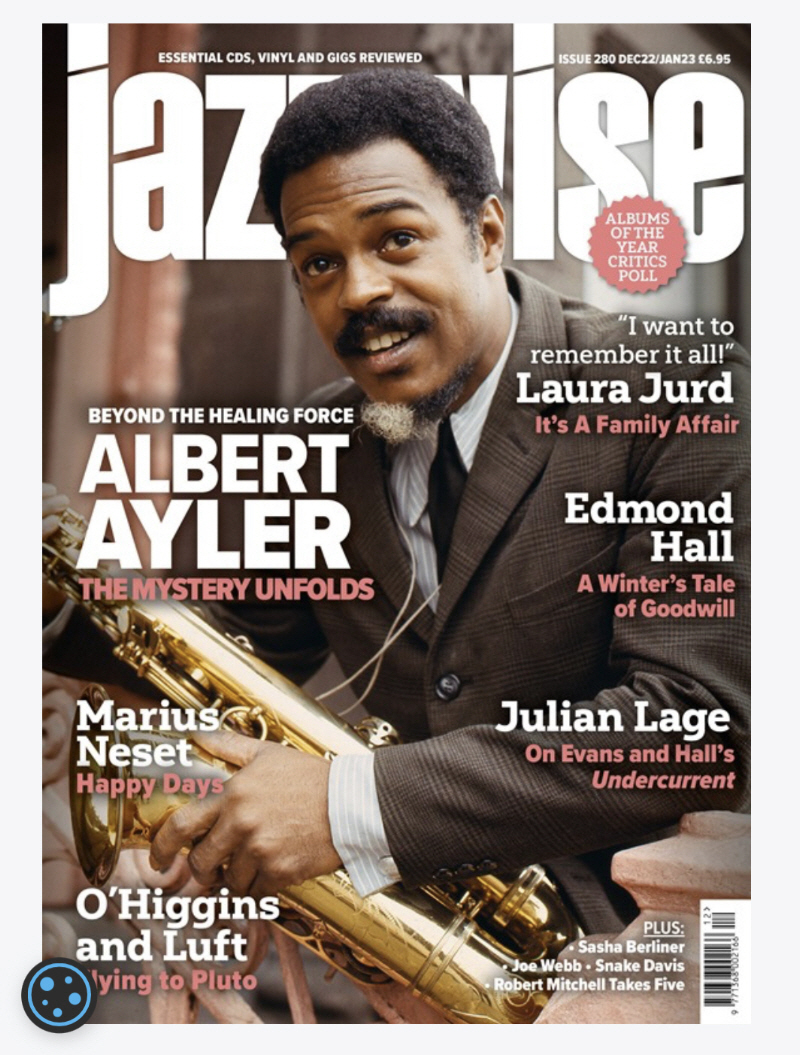 |
|||||||||||||||||||||||||||||||||||||||
|
This is the cover of the latest issue (No. 280, Dec. 22/Jan. 23) of Jazzwise magazine. It’s a good indication of what a stellar year this has been for Albert Ayler and his music. |
|||||||||||||||||||||||||||||||||||||||
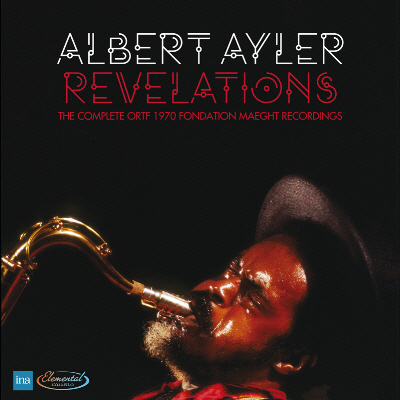 |
|||||||||||||||||||||||||||||||||||||||
|
The release of the complete recordings of Albert Ayler’s final concerts in France at the Fondation Maeght revised opinions of his later career choices (for some at least) and is an important new addition to the Ayler discography. |
|||||||||||||||||||||||||||||||||||||||
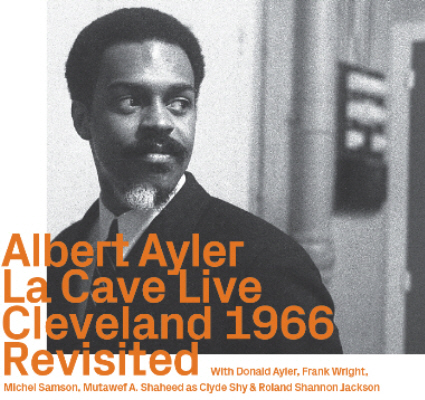 |
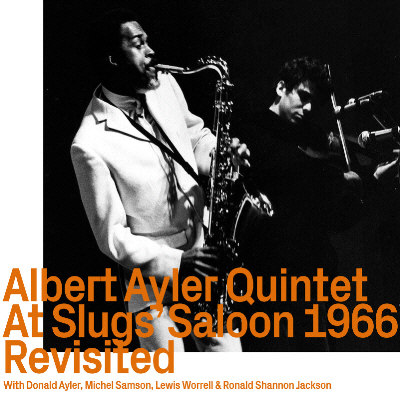 |
||||||||||||||||||||||||||||||||||||||
|
But, for those who revere the music of the various line-ups led by the Ayler brothers, then the rescue of the La Cave sessions from the legal limbo of Revenant’s Holy Ghost box set by Hat Hut, was of equal importance. And the icing on the cake was their release of a remastered version of Slugs’ Saloon. |
|||||||||||||||||||||||||||||||||||||||
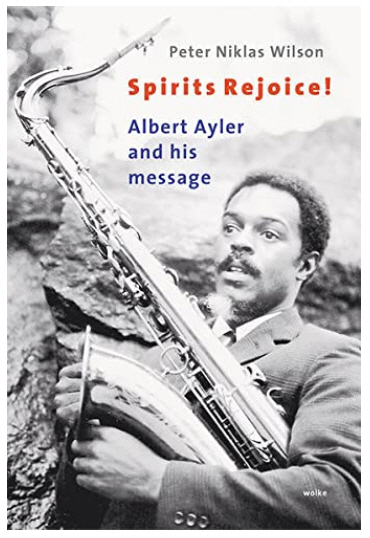 |
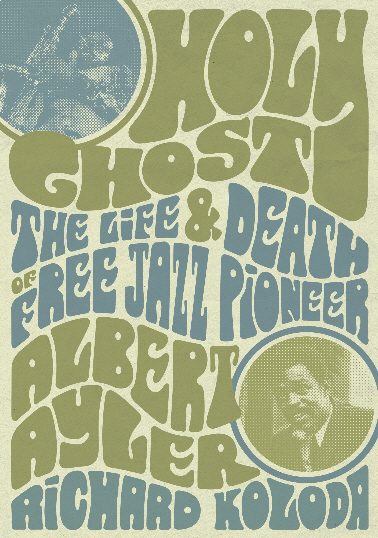 |
||||||||||||||||||||||||||||||||||||||
|
And then there are the books. The English translation (by Jane White) of Peter Niklas Wilson’s Spirits Rejoice! Albert Ayler and his Message, appeared in February, largely due to the efforts of Gordon Lobban. There’s a recent review on the London Jazz News site. Which brings us to what I still believe will be the definitive book about the Ayler brothers, Richard Koloda’s Holy Ghost: The Life & Death of Free Jazz Pioneer Albert Ayler. Published last month there’s a lot of new links to get through. Firstly, though, I should mention Carrie Roundtree-Lucas, who sadly passed away on 6th August. If you’ve read Richard’s book then you’ll know the part she played in the story of Albert Ayler. A Cleveland girlfriend and mother of Albert’s son, Curtis, Carrie Roundtree may also have been the reason Albert joined the army and ended up in Europe. Richard Koloda has been busy. There’s another interview on the Cleveland station WRUW recorded on 26th November (available until 9th December). He’s also doing a book signing (tomorrow) at Cleveland’s Visible Voice Books. And there’s a review of his book by Pierre Crépon in the current print issue (No. 446) of The Wire. And to round off, both Revelations and Holy Ghost: The Life & Death of Free Jazz Pioneer Albert Ayler are included in the WRTI’s ‘Jazz & Classical Treats In Our Holiday Gift Guide’. |
|||||||||||||||||||||||||||||||||||||||
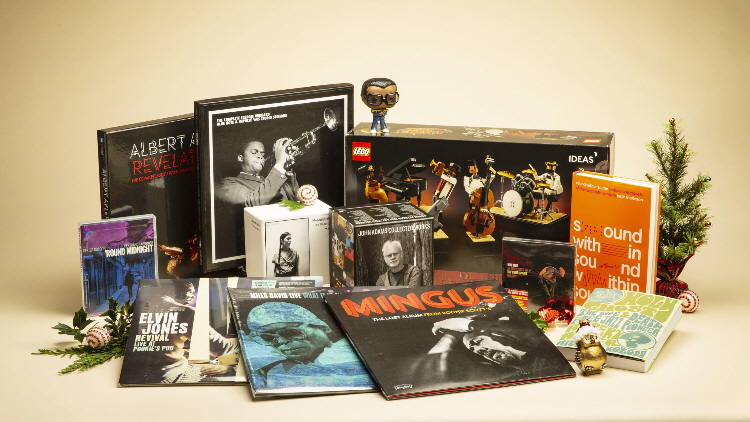 |
|||||||||||||||||||||||||||||||||||||||
|
However, not everyone is enamoured of Albert Ayler and he only makes it to No. 25 in the Music Grotto’s list of the ‘42 Best Saxophone Players Of All Time (Top Saxophonists Ever)’, sandwiched between Joe Lovano (No. 24) and Big Jay McNeely (No. 26). Still, he does better than Eric Dolphy who only manages to sneak in at No. 40, just in front of Gato Barbieri (No. 41) and Candy Dulfer (No. 42). The sublime Sonny Criss gets nary a mention. And I’m not sure about Albert’s position in this, otherwise, quite fascinating ‘Jazz Love Blueprint - A History of Jazz Music’, which is available from Dorothy and reviewed at That Eric Alper. |
|||||||||||||||||||||||||||||||||||||||
 |
|||||||||||||||||||||||||||||||||||||||
|
I just think ‘Albert Ayler’ should be bigger and Wynton Marsalis should be smaller. And why all the British stuff? But Jimmy Giuffre’s in there so shouldn’t moan too much (still haven’t spotted Sonny Criss yet). |
|||||||||||||||||||||||||||||||||||||||
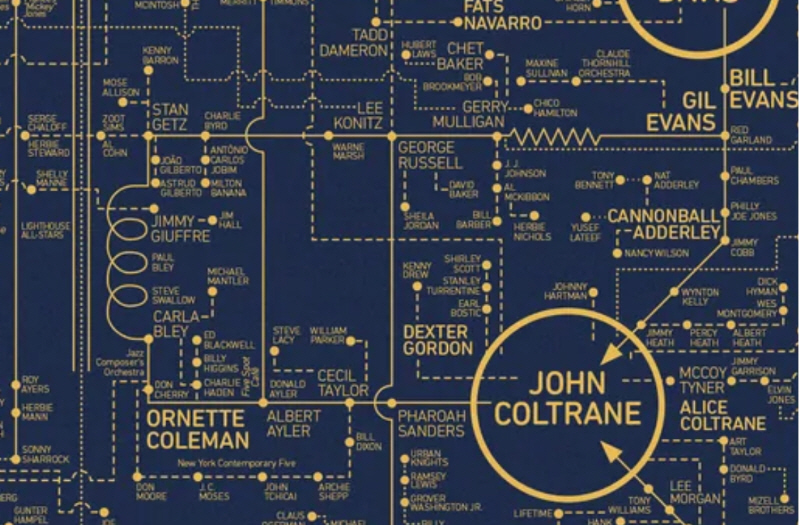 |
|||||||||||||||||||||||||||||||||||||||
|
Don Ayler Noël Akchoté has a new album (available on bandcamp and youtube) called D.O.A. (The Music of Donald Ayler, for Guitar). It’s a companion piece to his 2015 album A.A. - Plays The Music Of Albert Ayler. |
|||||||||||||||||||||||||||||||||||||||
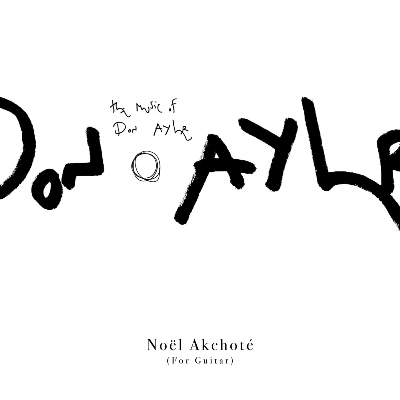 |
|||||||||||||||||||||||||||||||||||||||
|
And finally ... Christmas. Mars Williams is getting ready. |
|||||||||||||||||||||||||||||||||||||||
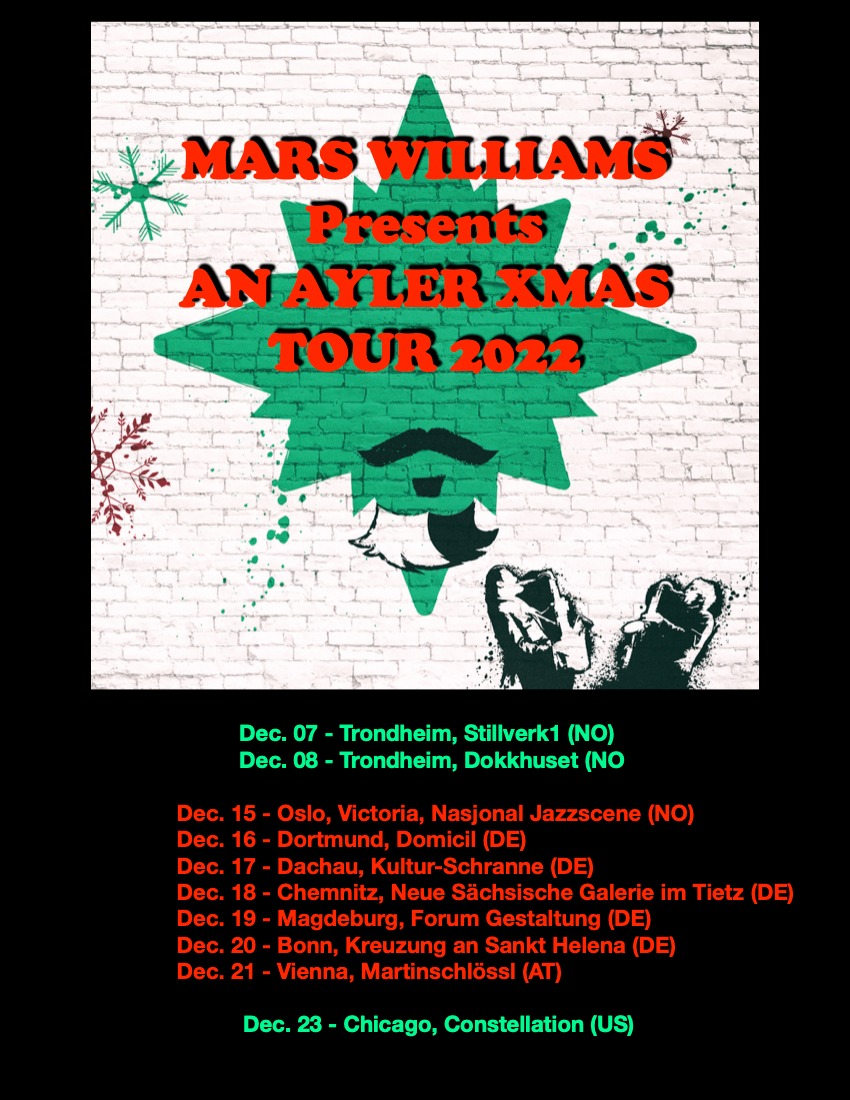 |
|
Dirk Goedeking reckons there’s a Greenwich Village vibe going on here: |
||||||||||||
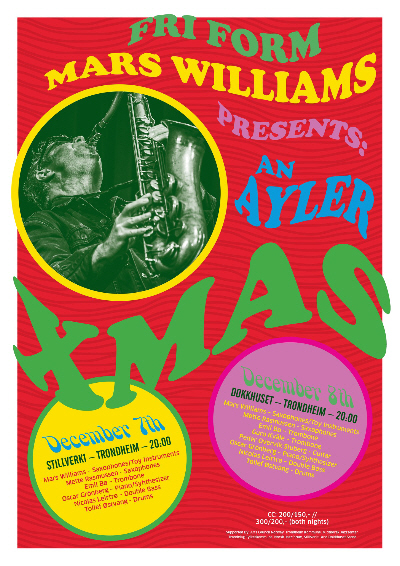 |
||||||||||||
|
Talking of Dirk, he usually sends me a host of Ayler-related Christmas gifts but this year - well I’ll let him explain: “This year I will keep it simple. Instead of running to the shops I did a little christmas decoration: - a minimalist nativity scene and |
||||||||||||
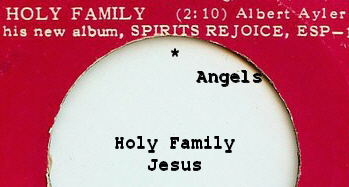 |
||||||||||||
|
- a christmas tree. |
||||||||||||
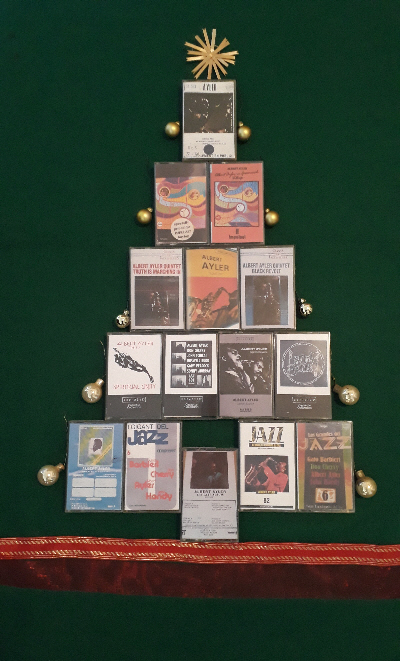 |
||||||||||||
|
The only present is a pair of socks. |
||||||||||||
 |
||||||||||||
|
Merry Christmas. ***
December 13 2022
Just a quick update: Mars Williams’ traditional Christmas concert will take place at Chicago’s Constellation on Friday 23rd December at 8.30 pm and will be livestreamed on youtube. |
||||||||||||
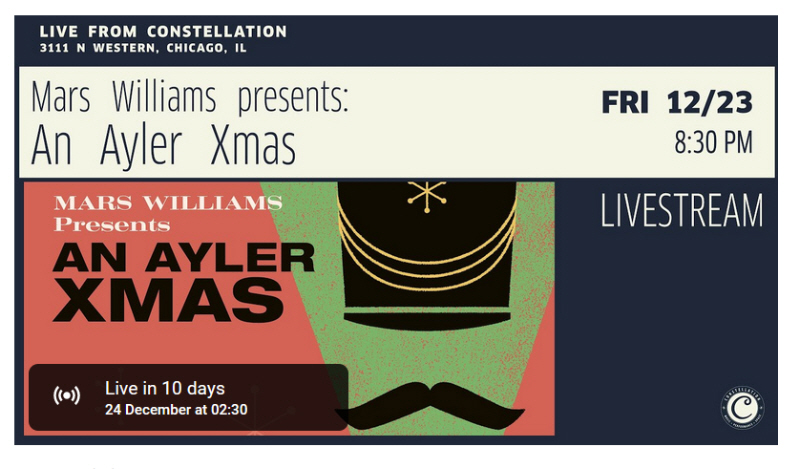 |
||||||||||||
|
*** News from 2004 (January - June) 2004 (July - December) 2005 (January - May) 2005 (June - December) 2010 (January - June) 2010 (July - December) 2011 (January - May) 2011 (June - September) 2011 (October - December) 2012 (January - May) 2012 (June - December) 2013 (January - June) 2013 (July - September) 2013 (October - December) 2014 (January - June) 2014 (July - December) 2015 (January - May) 2015 (June - August) 2015 (September - December) 2016 (January - March) 2016 (April - June) 2016 (July - August) 2016 (September - December) 2017 (January - May) 2017 (June - September) 2017 (October - December) 2018 (January - May) 2018 (June - September) 2018 (October - December) 2019 (January - May) 2019 (June - September) 2019 (October - December) 2020 (January - April) 2020 (May - August) 2020 (September - December) 2021 (January - March) 2021 (April - July) 2021 (August - December) 2022 (January - April) 2022 (May - August) 2023 (January - March) 2023 (April - June) 2023 (July - September) 2023 (October - December) 2024 (January - March) 2024 (April - June) 2024 (July - September) 2024 (October - December)
|
||||||||||||
|
Home Biography Discography The Music Archives Links What’s New Site Search
|
||||||||||||
